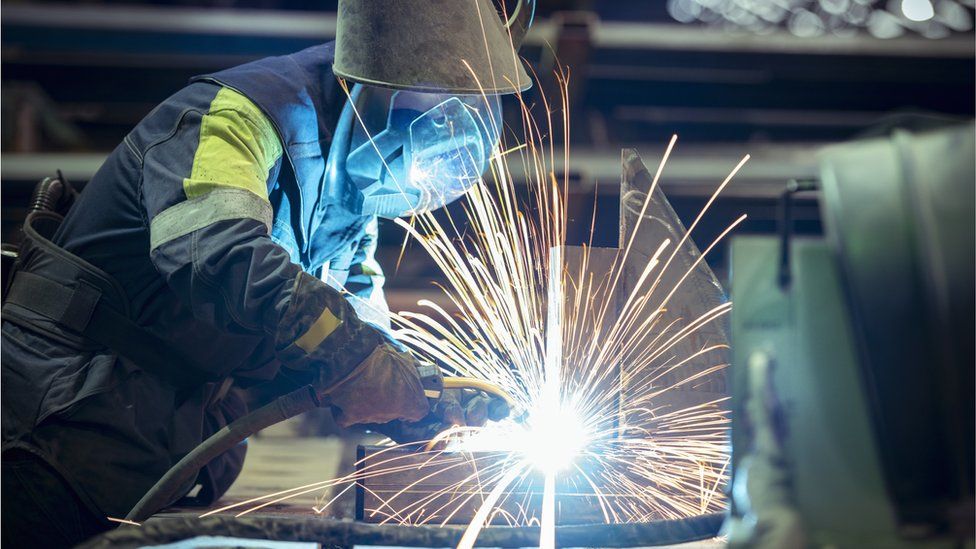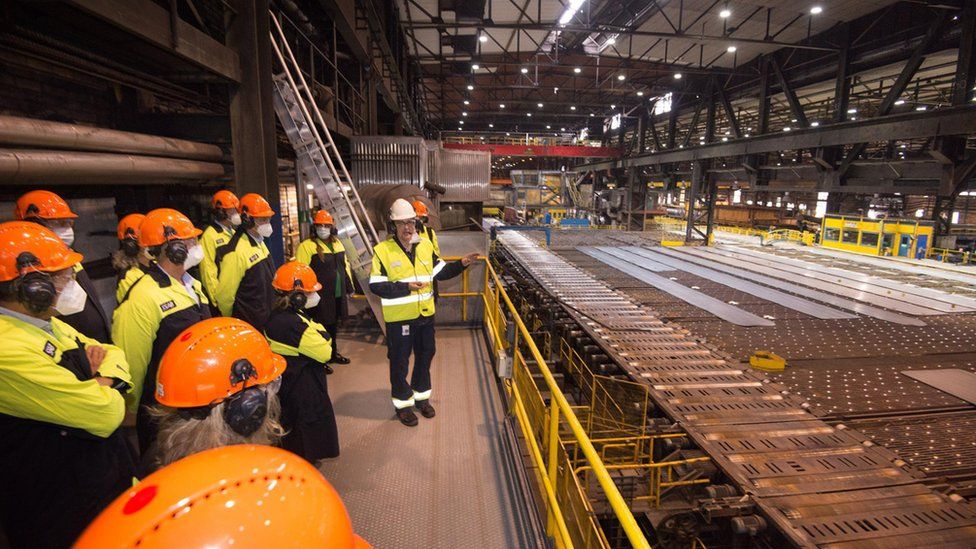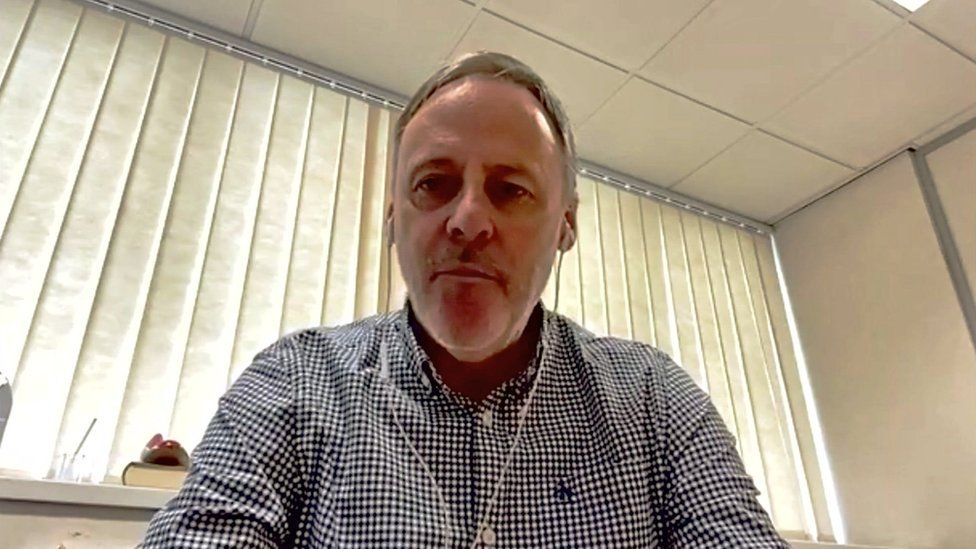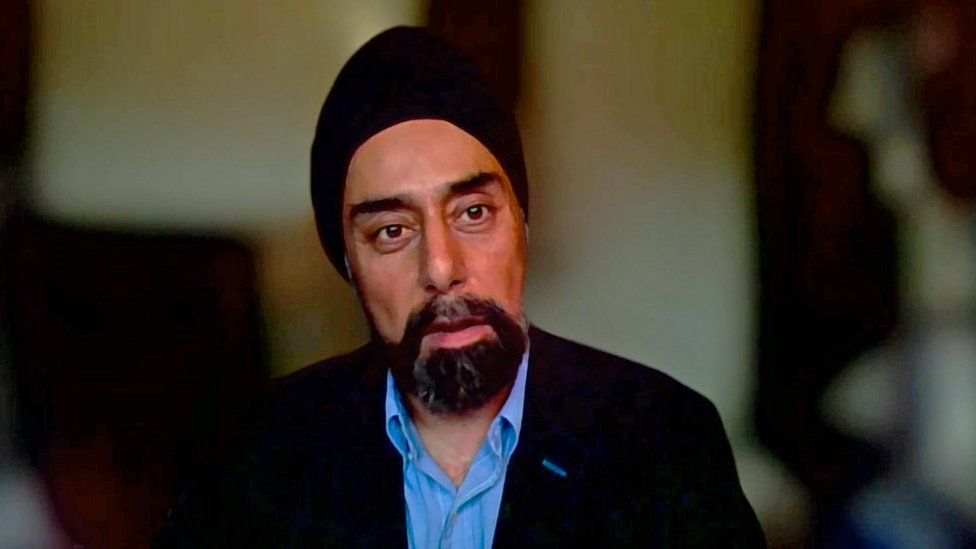
Up to 660,000 jobs could be at risk if the UK fails to reach its net-zero target as quickly as other nations, the Trade Union Congress (TUC) has warned.
The government has pledged to cut carbon emissions by 78% by 2035.
But the TUC fears many jobs could be moved offshore to countries offering superior green infrastructure and support for decarbonisation.
The union body is calling for an £85bn green recovery package to create 1.2 million green jobs.
TUC research from June shows the UK is currently ranked second last among G7 economies for its investment in green infrastructure and jobs.
The Department for Business, Energy and Industrial Strategy says the TUC's claims are untrue and it does not recognise their methodology.
It says it is currently considering the recommendations of an independent report into the future of green jobs.
A department statement said that "in recent months we've secured record investment in wind power, published a world-leading Hydrogen Strategy, pledged £1bn in funding to support the development of carbon capture and launched a landmark North Sea Transition Deal - the first G7 nation to do so - that will protect our environment, generate huge investment and create and support thousands of jobs."
At great risk are jobs in the steel industry, the union body says, because the manufacturing process is dependent on burning coal at high temperatures.
However, other nations are already bringing to market new technologies that enable steel production without using coal, such as Sweden.

In August, Hybrit, a joint venture between Swedish firms SSAB, LKAB and Vattenfall, made its first delivery of green steel using hydrogen from the electrolysis of water with renewable electricity, while another firm H2 Green Steel is planning to open a hydrogen plant in 2024.
SSAB now has a partnership with Mercedes-Benz to introduce fossil-free steel into vehicle production as soon as possible. The German carmaker wants its entire car fleet to be carbon-neutral across the entire supply chain by 2039.
The TUC's analysis suggests the jobs at risk include:
- 26,900 jobs in iron and steel
- 41,000 jobs in glass and ceramics
- 63,200 jobs in chemicals
- 18,000 jobs in textiles
- 79,000 jobs in rubber and plastics
- 15,500 jobs in paper, pulp and printing
- 7,800 jobs in refineries
- 7,400 jobs in wood products
- 900 jobs in cement and lime
The UK's green recovery investment is currently a quarter of France, a fifth of Canada, and 6% of the USA, it says.
According to TUC general secretary Frances O'Grady, the clock is ticking for the UK: "Thatcher devastated Britain's industrial heartlands with the loss of industry and jobs. Boris Johnson is on the brink of doing more of the same."
Unless the government urgently scales up investment in green tech and industry, the UK could risk losing hundreds of thousands of good jobs to competing nations, she warned.
"If we move quickly, we can still safeguard Britain's industrial heartlands," said Ms O'Grady.
"The government should boost investment to at least the G7 average and commit to the Green Jobs Taskforce plans in full."


Unions and bosses aren't always on the same page, but when it comes to carving out a green future, they are broadly at one.
They say the government needs to step in further to plan and help pay for what's being called an "industrial revolution", warning the UK could lose out to other countries who are investing more heavily.
Revolutions are rarely bloodless. The transition to a net-zero economy will inevitably have some impact on traditional jobs, especially in polluting industries. That's spelt out in the government's Green Jobs Taskforce report from July.
So it's a delicate time. The extent of the impact will depend on the policy decisions we make now.
On whether sectors like the steel industry can be persuaded that there is a tasty enough "carrot" to go green, in the form of incentivising demand for a greener product perhaps or extra funding. And that the "stick", in the form of any policy to push them to net-zero, won't be used too aggressively.
It's a difficult path for the government to tread. The UK has a legally binding commitment to stop contributing to climate change by 2050.
However this will come at a massive financial cost, at a time when the global pandemic has left the UK with high levels of public debt.
With all that in mind, the government will set out more information on how the move to net-zero will happen and how it will be paid for, in its Net Zero Strategy which will be launched ahead of the COP26 summit at the end of October.

'The UK isn't even putting our toe in the water'

Alan Coombs, 56, is a community union representative at the Port Talbot steelworks, the largest steel production plant in the UK with around 4,000 workers.
Mr Coombs has worked at the plant for 40 years. He is worried that the UK is falling behind Europe because no new technologies have been set out and the workforce has not received feedback on conversations owner Tata Steel is having with the government.
"Companies overseas are already setting target dates for green steel, but the UK isn't even putting our toe in the water and it's everyone in the community that's worried," he told the BBC.
"We've got to have a strategy of what it looks like - how we actually make the steel going forward."
He says he can't see how any firm will be able to deliver new technologies without government support, because it will be expensive.
But most of all he thinks speed is urgently needed: "We need to determine what it looks like for us and get on with it - because, environmentally, I think most every industry realises it's got to change.
"We are not part of the debates, so you can imagine - people are [like], 'Where am I going to be working? What's going to happen to the plant that I work on... and what is the future going to look like?"
'We have to make that adjustment'
Critiquing the TUC's analysis, Prof Jagjit Chadha, director of the National Institute of Economic and Social Research (NIESR), points out that the UK has "made significant progress since 1990" on cutting carbon emissions.

"In the UK, we're almost halfway towards our target, as of last year, in part helped perversely by the Covid crisis," he said.
He is not certain it is possible to truly tell whether the UK has lost its competitiveness in international trade, particularly since other countries generate more pollution than the UK.
He also says that only "a very small fraction of people" - namely 2-3% of the labour force - is directly affected by the UK falling behind other nations in net-zero targets.
However, he sees it as inevitable that all industries will eventually have to go green and wants government plans "that promote the rotation of the economy away from one that's emitting carbon emissions to one which isn't."
When the UK was part of the EU, it was given about £7bn from the European Investment Bank per annum, which then led to £20bn in investment a year, so now the government will need to find investment to replace that, and this needs to be a long-term economic strategy.
"If we think about that happening over the next 10 years, we're then talking about public and private investment public together, probably in the region of £200bn," he said.
https://news.google.com/__i/rss/rd/articles/CBMiLGh0dHBzOi8vd3d3LmJiYy5jby51ay9uZXdzL2J1c2luZXNzLTU4NTE5OTk20gEwaHR0cHM6Ly93d3cuYmJjLmNvLnVrL25ld3MvYnVzaW5lc3MtNTg1MTk5OTYuYW1w?oc=5
2021-09-11 23:42:08Z
52781875607479
Tidak ada komentar:
Posting Komentar